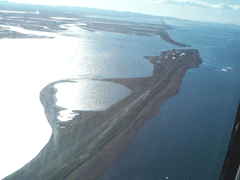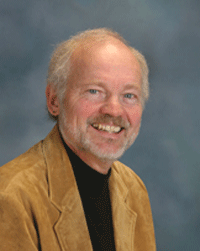Taking Climate Offenders to Court
Air Date: Week of March 7, 2008

The Alaskan village of Kivalina is losing ground to erosion and rising sea levels. (Photo: U.S. Army Corps of Engineers)
Suing the corporations involved with producing greenhouse gas emissions is a new legal strategy - but will it be a successful one? Vermont Law School Professor Patrick Parenteau talks with host Steve Curwood about environmental litigation and the latest global warming lawsuit against energy companies- Kivalina v. Exxon.
Transcript
CURWOOD: From the Jennifer and Ted Stanley Studios in Somerville, Massachusetts – this is Living on Earth. I’m Steve Curwood.
As the arctic melts, the coastal village of Kivalina in Alaska is falling into the sea. Soon, the four hundred or so Inupiat that live there will have to pack up and move out – a dislocation they say could cost up to $400 million. So they are suing for moving expenses. The defendants are two dozen energy companies, including ExxonMobil, BP, Peabody Energy and American Electric Power. The villagers charge the corporations with creating a public nuisance, and conspiring to mislead the public about climate change.

The Alaskan village of Kivalina is losing ground to erosion and rising sea levels. (Photo: U.S. Army Corps of Engineers)
CURWOOD: Hello there.
PARENTEAU: Hello Steve. How are you?
CURWOOD: Good. Tell me, what exactly is a public nuisance for you lawyers?
PARENTEAU: It’s a very old doctrine, which basically says one person can’t use their property in a way that unreasonably interferes with another person’s use of their property. And in this case of course the Kivalinans are essentially saying you’re destroying our entire community as a result of the greenhouse gases you are emitting. You’re doing so either deliberately and intentionally or you’re doing it negligently, but either way you’re responsible for the fact that we’re now going to have to move our community at a cost of several hundred million dollars.
CURWOOD: Professor Parenteau, I drive a car, I take hot showers, we use electricity here to run Living on Earth radio studio. Why don’t the residents of Kivalina sue me and Living on Earth for our activities?
PARENTEAU: Well, they sue the companies that have the deep pockets. That’s the answer. They’re looking for a recourse to the companies that have the money, the wherewithal to actually pay for the damage that they allege they’re causing. And it’s true that you could file a class action lawsuit against a much larger number of potentially responsible parties – that is, people that are responsible for greenhouse gas emissions – but common law, the doctrines that the Kivalinans are using in this case, basically does allow you to cherry pick. It allows you to pick out the largest and the wealthiest and say, you’re responsible and you have the means to deal with this problem and so we’re going to hold you to account.
CURWOOD: Now, these cases are perhaps somewhat reminiscent of the class action lawsuits against the tobacco industry in the 1990's?
PARENTEAU: Yes, very much so, and the claim that the Kivalinans have made – that the companies deliberately set out to deceive the public about climate change, and continue to expand their operations and put even more greenhouse gases into the atmosphere, knowing that there was pretty strong science showing that those emissions were having an adverse impact on sea level rise and other things – all of those allegations are very similar to the kinds of allegations made against the tobacco companies several decades ago.
CURWOOD: These lawsuits are often dismissed and they’re certainly criticized as being too political. What do you suppose is meant by that?
PARENTEAU: The courts want to see the legislature, either the United States Congress or perhaps state legislatures, enact some laws to give the courts some guidance on how to assign liability for something as massive as climate change. So the judge in California dismissed the lawsuit against the automakers on that basis, basically saying we courts are not competent enough to try to decide who is responsible for this problem. We want to see the political branches of the government act first.

Law Professor Patrick Parenteau says the courts might eventually hold energy companies liable for damages caused by global warming. (Photo: Courtesy of Ed Chapin)
PARENTEAU: This case has a lot going for it. There still are significant legal hurdles. The courts are gonna have to decide that they can deal with these kinds of cases, that these parties have a legitimate claim to relief, that they’re not getting relief from the governments and that they can only look to the courts for relief. I think this case could be a breakthrough. It’ll take the same kind of breakthrough we had with tobacco, where the states finally brought a case after years of losing that won. And the reason they won is because they said, ‘we’re incurring these substantial costs for healthcare, never mind whether individual smokers can say that your cigarettes killed me.’ The fact of the matter is, smoking in general raised the healthcare costs, and the states got stuck with the bill for that, and the states were ultimately able to recover substantial – billions and billions of dollars for that. I think climate change may be at a point where we could see a similar breakthrough, and this case may be it.
CURWOOD: Patrick Parenteau is professor of law and senior council to the Environmental and Natural Resources Law Clinic. Thank you sir.
PARENTEAU: It was a pleasure, Steve.
Links
Living on Earth wants to hear from you!
Living on Earth
62 Calef Highway, Suite 212
Lee, NH 03861
Telephone: 617-287-4121
E-mail: comments@loe.org
Newsletter [Click here]
Donate to Living on Earth!
Living on Earth is an independent media program and relies entirely on contributions from listeners and institutions supporting public service. Please donate now to preserve an independent environmental voice.
NewsletterLiving on Earth offers a weekly delivery of the show's rundown to your mailbox. Sign up for our newsletter today!
 Sailors For The Sea: Be the change you want to sea.
Sailors For The Sea: Be the change you want to sea.
 The Grantham Foundation for the Protection of the Environment: Committed to protecting and improving the health of the global environment.
The Grantham Foundation for the Protection of the Environment: Committed to protecting and improving the health of the global environment.
 Contribute to Living on Earth and receive, as our gift to you, an archival print of one of Mark Seth Lender's extraordinary wildlife photographs. Follow the link to see Mark's current collection of photographs.
Contribute to Living on Earth and receive, as our gift to you, an archival print of one of Mark Seth Lender's extraordinary wildlife photographs. Follow the link to see Mark's current collection of photographs.
 Buy a signed copy of Mark Seth Lender's book Smeagull the Seagull & support Living on Earth
Buy a signed copy of Mark Seth Lender's book Smeagull the Seagull & support Living on Earth

